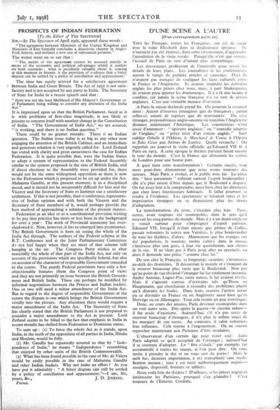SIR, —In The Spectator of April 29th, appeared these words :
"The agreement between' Ministers of the United Kingdom' and Ministers of Eire formally concludes a disastrous-chapter in Anglo- Irish history, and initiates a new one of substantial promise."
The writer went on to say that :
" The merits of -the agreemedo -cannot be assessed merely in terms of the economic and political advantages which it confers on- both ccjuntries : what is peculiarly valuable about it, coming at this moment in history, is the provision of evidence that a bitter
dispute can be settled by a policy of conciliation attdappeaseirieni:" - .
The time has surely arrived for a satisfactory agreement u between India and Great Britain. The Act of 5935 is not satis- factory and is not accepted by any party in India. The Secretary of State for India. in a recent speech said that : "'there was not the least likelihood,of His Majesty's Government or of Parliament being willing to consider any alteration of the India Act."
It is impressed upon us that the British Parliament, faced as it is with problems of first-class magnitude, is not likely at present to concern itself with another change in the Constitution of India. " The Government of India Act," we are assured, " is working, and there is no Indian question."
There could be no greater mistake. There is an Indian question. The Indian issue today is as big as any other now engaging the attention of the British Cabinet, and an immediate and generous solution is very urgently called for. Lord Zetland has stated with clarity and great earnestness the case for Indian Federation. It is quite possible that, were the Indian States to adopt a system of representation to the Federal Assembly similar to the system proposed in the case Of British India, and if direct elections to the Assembly were provided for, there would not be the same widespread opposition as there is now to the Federation which is proposed to be set up under the Act. Mahatma Gandhi, at this present moment, is in a disciplined mood, and it should not be insuperably difficult for him and the Viceroy and the Secretary of State to hammer out a satisfactory settlement. If this knot possible, then a conference, representa- tive, of Indian opinion and with both the Viceroy and the Secretary of State members of it, would perhaps provide the best method of approaching a solution of the present impasse.
• Federation as an idea or as a constitutional Provision waiting to be put into practice his more or less been in the background for over a year : The work of Provincial autonomy has oVer- shadowed it. Now, however, it has re7emerged into prominence. The British Government is keen on seeing the whole of the India Act through. The authors of the Federal scheme at the R.T. Conference and at the Joint Parliamentary Committee do not feel happy when they see most of that scheme' 'still hanging in the air. The Congress Party wishes to alter materially the whole of that part of the India Act, not only on account of the provisions which are specifically federal, Mit also on account of the character of responsible Government conceded to the centre. The purely Federal provisions have only a few objectionable features (from the Congress point of view) and they are not primarily an issue between the British Govern- ment and British India. These can perhaps be modified by informal negotiations between. the Princes and Indian leaders. One or two will need a minor amendment of the India Act. But in regard to the degree of responsible Government at the centre the dispute- is one which brings the British Government vividly into the picture. Any alteration there would require a major amendment of the India Act. The Secretary of State has clearly stated that the British Parliament is not prepared to consider a major amendment to the Act at present. Lord Zetland 'seems to be blind to the fact that emphasis in India in recent months has shifted from Federation to Dominion status.
To sum up : (x) To force the whole Act as it stands, upon India, in the teeth of the opposition of all parties in India, Hindu and Moslem, would be folly.
(z) Mr. Gandhi has repeatedly assured us that by " Inds- _ pendence of India," - he means " Independence " resembling that enjoyed by other units of the British Commonwealth. ' (3) What has been found possible in- the case of Mr. de Valera Would be easily possible in the case of Mahatma Gandhi and other Indian leaders. 'Why 'not make an effort ? As you have- put it admirably : " A hitter dispite can still be settled by a policy of conciliation and appeasement."—I am, Sir, Poona.'


















































 Previous page
Previous page